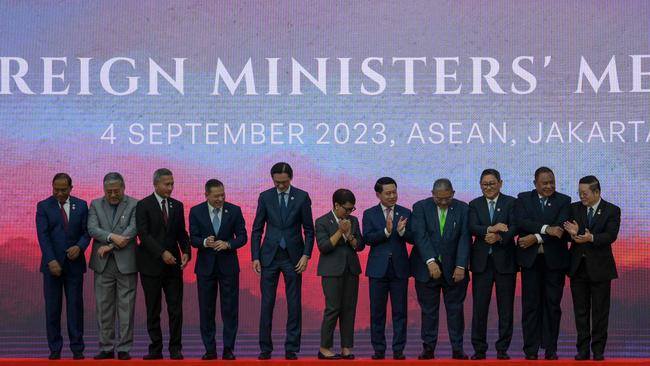ASEAN chair’s Myanmar business links ‘hypocrisy’
Indonesia-Myanmar business roundtable meeting in Jakarta has prompted outrage from Myanmar pro-democracy activists.

Indonesia has been accused of hypocrisy for championing a stronger regional response to the crisis in Myanmar while seeking investment opportunities in the country’s infrastructure and critical minerals sector that would likely enrich the regime.
President Joko Widodo is expected to lobby fellow ASEAN leaders during Tuesday’s annual leaders’ summit in the Indonesian capital to agree on additional measures to navigate an end to the ongoing violence in Myanmar.
Yet even as his Foreign Minister Retno Marsudi warned fellow ASEAN ministers on Monday they still “had homework to do … to ensure a peaceful and lasting solution in Myanmar”, business leaders – including some close to the military junta – were arriving in Jakarta for an Indonesia-Myanmar business roundtable under the auspices of the ASEAN business and investment summit.
The meeting, to be chaired by one of Indonesia’s most powerful businessmen and head of the ASEAN Business Advisory Council Arsjad Rasjid, and attended by members of the Union of Myanmar Federation of Chambers of Commerce and Industry, has prompted outrage from Myanmar pro-democracy activists.
Justice for Myanmar on Monday condemned the business roundtable – expected to focus on Myanmar’s critical minerals and potentially also rare earths industry currently dominated by Chinese companies – as “deplorable”. It urged ASEAN BAC to “end its pursuit of business with the junta and its cronies, which directly undermines the Myanmar people’s struggle for democracy”.
“The UMFCCI is a crucial supporter of the illegitimate military junta and key board members are linked to the military conglomerate, Myanmar Economic Corporation,” JFM spokeswoman Yadanar Maung told The Australian. “ASEAN BAC under Indonesian leadership has chosen to work with junta cronies, undermining the movement for democracy and the policies of the legitimate National Unity government.”
The Myanmar military controls significant sections of the country’s economy through the MEC and another holding company, Myanma Economic Holdings Limited.
Both companies, and many businesspeople linked to them, are now subject to dozens of economic sanctions by Western nations including the US, Australia, EU and Canada, in an attempt to deprive the junta of money and force it to the negotiating table.
ASEAN continues to exclude junta leaders and ministers from high-level meetings while the regime ignores the bloc’s Five Point Consensus plan to end the crisis, though neither the organisation nor individual member states have imposed sanctions on the junta. In recent months, however, Indonesia has actively courted investment opportunities in Myanmar through the ASEAN BAC, which it also chairs.
Mr Rasjid, who also chaired Indonesia’s G20 Business summit in 2022, has made several trips to Myanmar this year, including in May as part of an ASEAN BAC road trip to promote regional food security, renewable energy and an integrated electric vehicles industry. He told junta mouthpiece Global New Light of Myanmar during that visit the country’s “rich reserves of critical minerals are crucial for the growth of various industries, including the solar panel, lithium battery and electric vehicle industries in ASEAN”.
A former Myanmar-based Australian businessman, who asked not to be named, said while none of the business delegation visiting Jakarta this week appeared to be subject to international sanctions, the move was “at odds with its role as ASEAN chair and undermines its efforts to bring an end to the crisis”.
A spokesman for Indonesia’s Chamber of Commerce and Industry defended its participation in the roundtable, telling The Australian it was “committed to promoting peace and stability in Myanmar, but the purpose of the ASEAN business investment summit and ASEAN BAC is to instil business confidence in the growth potential of the region”.
“In doing so, inclusivity is a priority to make sure no one is left behind. The people of Myanmar deserve to see their lives improved as much as any other ASEAN population. By connecting businesses and companies throughout the region, ABIS aims to ensure that primary needs such as food security and health resilience are met everywhere in ASEAN.”
Myanmar’s mining sector has been a key source of wealth for the country’s military and, while earnings from resources such as copper and jade have declined as a result of the unrest and active resistance to the regime, rare earth mining has exploded in border regions with China. Beijing has become reliant on Myanmar as an alternative rare earths supplier, even as civil society groups such as Global Witness have warned of the “high risk that revenues from rare earth mining are being used to fund the military’s abuses against civilians”.
China Southern Rare Earth Group sources as much as 70 per cent of raw materials from Myanmar despite the National Unity government – the parallel civilian administration, comprising elected members of the ousted government, ethnic leaders and activists – declaring all rare earth mining operations illegal because the proceeds flow to the junta.




To join the conversation, please log in. Don't have an account? Register
Join the conversation, you are commenting as Logout